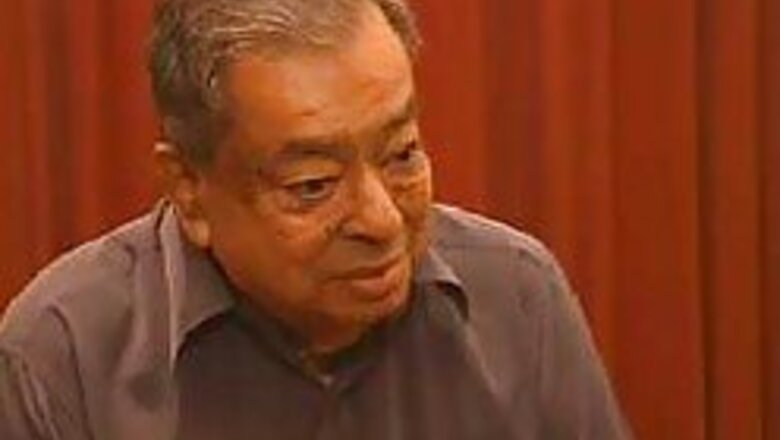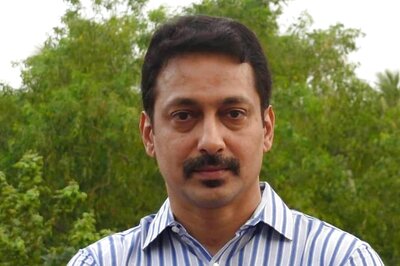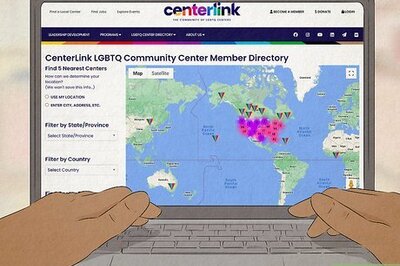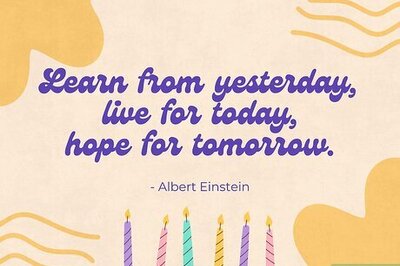
views
Dr Verghese Kurien built brand Amul and pioneered the cooperative milk movement in Gujarat. After heading the Gujarat Cooperative Milk Marketing Federation for 33 years, he resigned.
Anuradha Sengupta caught the normally combative Kurien in a restrained mood and found out about his life after the resignation.
Anuradha Sengupta: Dr Kurien your life is testimony to the fact that you're a fighter. When you resigned on March 20 was that an acceptance of defeat? It was not a resignation that you happily submitted.
Verghese Kurien: I resigned because I felt that I had lost the confidence of the marketing federation’s members. As its chairman I felt that if I don't have their confidence then it’s my duty to submit my resignation, which I did.
Anuradha Sengupta: Why did you lose that confidence? People in India are link with you and the brand that they use in their everyday life is a result of your work --- the brand Amul. How do they understand that someone who has created, someone who was very valuable to that brand, is no longer a part of the organisation?
Verghese Kurien: Why was Jesus Christ crucified?
Anuradha Sengupta: Are you trying to say that we need to see you as a martyr?
Verghese Kurien: You can view me in any way you like, but the point is I did my job and I tried to give the best I could for it.
Anuradha Sengupta: Why did you think you lost the board members’ confidence?
Verghese Kurien: I think you should ask them.
Anuradha Sengupta: The reasons are only hinted at, and range from the state BJP government wanting to make inroads into the powerful milk cooperatives, to the growing ambition of individual district cooperatives to former aides turning foes. According to the charismatic Keralite from Gujarat, all legendary successes sow the seeds of their own destruction. People trusted you; the first question they asked was is he reliable and can he be trusted. Not whether he is a Keralite or is he a Gujarati but whether he is honest, capable? Is there no credence to the sons of soil theory here?
Verghese Kurien: If somebody wants to screw up, they may use it; they may play that card. As far as I am concerned, it is not a good card to play. It could well be that somebody else developed ambition to replace me.
PAGE_BREAK
Anuradha Sengupta: You have said that there are people beyond the board who may be manipulating the board. Are you referring to political parties and their ambitions and aspirations? And who are these people?
Verghese Kurien: I am leaving it to you to find that out.
Anuradha Sengupta: Mr Vyas, whom you groomed as managing director, did he also turn against you?
Verghese Kurien: It is possible.
Anuradha Sengupta: Why would that be, sir?
Verghese Kurien: Why did people I groomed --- the ones whom I built --- why did they turn against me. It is logical evolution. Why was Caesar stabbed, it is a logical evolution.
Anuradha Sengupta: The institute where Dr Kurien started to produce professional managers or farmers is still his. Ironically, for a man whose zeal is to regard democracy as the corner stone of cooperatives is often described as autocratic.
Things having come to this level, do you still like to be in control of whatever you are heading for?
Verghese Kurien: Yes, naturally.
Anuradha Sengupta: Is it because people who feel that they have executive powers to run these organisations would feel stifled or curtailed if you do not allow them to come into their own?
Verghese Kurien: The Chairman has certain obligations; he has control over those that work under him. If he feels they are going wrong than he has to correct them and if he cannot correct them he should dismiss them. I had to perform the Chairman's duties whether it was liked or not.
Anuradha Sengupta: Are you dictatorial?
Verghese Kurien: In certain matters I may be dictatorial. Where I feel I am right I am dictatorial and I will not surrender.
Anuradha Sengupta: Where does Dr Kurien go from here?
Verghese Kurien: At the age of 84 I have no future to look forward to, I have only to rest my laurels on my past.
Anuradha Sengupta: Would you not have liked to see the past differently?
Verghese Kurien: There is poetic justice in all this, I feel if you look back or you read any story you will find the ending can only be this way.
Anuradha Sengupta: Adverts of products from paneer to pizza --- all under the Amul brand --- have punctuated India’s urban landscape. Without being aware, many of us are inexorably linked to the historic story of the struggle and success of the Amul brand. What started as a chance to give poor farmers control over their lives has today become for many a symbol of the good life. How difficult was it for you to convince your colleagues to invest in brands and in marketing activities?
Verghese Kurien: I had a lot of trouble getting Tribhuvandas Patel(the Chairman of Amul then) to sanction Rs 2 lakh, as he thought that it was a waste of money. But due to my insistence he agreed ultimately. It was just Rs 2 lakh then, today we spent over Rs 39 crore each year.
Anuradha Sengupta: You studied nuclear physics and metallurgy, then you got into the dairy sector. Where and how did you become a man who understood the importance of marketing so strongly?
Verghese Kurien: It is obvious to any thinking man that the key to increase production is marketing. It is impossible to increase production without marketing.
PAGE_BREAK
Anuradha Sengupta: The Amul butter mascot: When it was first presented do you remember what it was like and why did you say it was right to do that?
Verghese Kurien: I think it was Sylvester D'Cuhna who introduced the mascot and it was a very clever and also the slogan 'Amul-The taste of India', was also very clever idea.
Anuradha Sengupta: How involved were you in this advertising communication process?
Verghese Kurien: I was very much involved and nothing could be done without my approval in advertising.
Anuradha Sengupta: Why did you as the person who was responsible for everything --- right from getting equipment to dealing with bureaucrats and politicians and even to play host to people who visited Anand in your home --- feel the need to be personally involved in advertising and communication?
Verghese Kurien: Advertising cannot be delegated to the director. It has to be handled by the top man if it is to make an impact so it had to be handled d by me.
Anuradha Sengupta: You in fact went on to get the different district cooperatives to under the VCMMF and use the Amul brand, How difficult was it to convince people to do that?
Verghese Kurien: The difficulty should normally have a reason. Tribhuvandas Patel out of his generosity, and also a lightened self-interest, did not demand any money for using the famous brand. This resulted in district cooperatives getting involved with Amul.
Anuradha Sengupta: But that is not commonsense these days, the Amul brand faces challenges from sister co-operatives that want to go back their own brand?
Verghese Kurien: The brand now belongs to GCMI.
PAGE_BREAK
Anuradha Sengupta: Does it not belong to Amul anymore, there were some reports that it was registered by the Kerala district cooperative and that it belonged to it. Is it so?
Verghese Kurien: Yes, but they handed it over by right. If a brand becomes federations, for example New Zealand dairy board did so with Anchor --- their trade name. They did it all under the Anchor name, so they understood a common brand name is far better than every dairy having its own brand name and spending money, competing with each others a fruitless task.
Anuradha Sengupta: The single minded concern for his cause was courtesy a chance encounter with Tribhuvanas Patel, the man who started the Amul cooperative. Born into an educated and wealthy Christian family in Kerala, Kurien knew even as a child that he was destined to succeed. He had brains and brawn and he was willing to work. You came here purely by chance isn't it?
Verghese Kurien: My education in the US was funded by the Government of India on condition that on returning I would serve for five years there where they would send me. They sent me to Anand.
Anuradha Sengupta: So Anand was not out of choice? In those early days you were a man very different from the man now. You were not interested in the dairy sector and you were not someone who would have thought of spending life in Anand. I believe you used to go to Mumbai for holidays whenever you could?
Verghese Kurien: When ever I needed to relax I went to Mumbai.
Anuradha Sengupta: What made this transition in Verghese Kurien? The Verghese who came to Anand and thought of a future when he would be away from here and a Verghese Kurien who at 84 lives and belongs to this place only?
Verghese Kurien: It is because my resignation from my contract was accepted by the government. As I was packing my bags to go, Tribhuvandas Patel came to see me in the garage. I told him that my resignation had been accepted. He said, "don't go, Anand needs you." I unpacked and I remained here.
Anuradha Sengupta: Is it what he said to you that you changed your decision. Do destinies get diverted because of a mentor, and this has happened in your life too isn’t it?
Verghese Kurien: Yes, in that regards I have also been instrumental in some peoples’ lives remaining here. And as far as staying in Anand is concerned, it is not a bad place it is a good place.
Anuradha Sengupta: Do you remember what Anand was like when you first came here?
Verghese Kurien: I had to live in a garage initially, because of being a Christian and also because I was a bachelor.
Anuradha Sengupta: You were a very good looking man as your photos say so.
Verghese Kurien: What do you mean I was, I still am.
Anuradha Sengupta: You emphasise that old values led by personal integrity is the bedrock of your endeavours and achievements, when did you realise that was the best way to be?
PAGE_BREAK
Verghese Kurien: I knew from a long time that integrity is important and you should serve with commitment, that is the secret of success.
Anuradha Sengupta: But it isn't easy because if you look back at your career you have had several run-ins with different people even across borders
Verghese Kurien: Yes, and I always won.
Anuradha Sengupta: Why do you think you always won?
Verghese Kurien: It is because I was right.
Anuradha Sengupta: You manage to get away easily isn't it. You have questioned ministers. For example you asked a minister to stop the import of butters, so that Amul butter could find a market. Do you think times have changed radically from that time to now?
Verghese Kurien: It is possible. That caliber of ministers is no longer easy to find now.
Anuradha Sengupta: Is it because that was the time when India had just become independent?
Verghese Kurien: Yes and the ministers were freedom fighters too, they became ministers not to wield power but to serve the nation.
Anuradha Sengupta: Do you think that idealism is no longer present in public life?
Verghese Kurien: I may not say so, but I can say that it does not exist to the same extent as it used to before. You can’t say that now there is no idealism; the Finance Minister is a good man, so is the Prime Minister and even the President.
Anuradha Sengupta: You have shown cooperatives can be a success of but they have succeeded only in the milk sector. Why?
Verghese Kurien: It is because milk is the only agricultural commodity that needs to be marketed, thrice a day, every day of the year and that too within a few hours of production, other wise it become s total loss. The farmers who produce the milk have no bargaining strength to hold it back for a better price so they are to gain power over the production and the marketing of milk if they are to get the maximum benefit.
PAGE_BREAK
Anuradha Sengupta: You actually managed to get finances for Operation Flood by spotting to use the opportunity in surpluses in European countries, isn't it with milk production, could you explain on that bit on this?
Verghese Kurien: We managed to build up a huge surplus in Europe. The surplus would be very large and the correct economic solution to the large surplus would have been to set fire to it not destroy it. But unfortunately public opinion of these countries themselves will not permit them to burn a good food and the whole world is aware that half of the world is hungry. I in my part had to quickly take the action in order to see that they did not dump it our country and harm the butter market. I went to Rome and talked about it, I specified that I would see to the brand. It is not a threat now as what was a threat has been converted to an opportunity.
Anuradha Sengupta: What was the most challenging times, was it always the confrontation with the bureaucrats?
Verghese Kurien: Yes it was, but the basic problem was to earn and to keep the confidence of the promise in you and to work in manner that you keep the confidence.
Anuradha Sengupta: Do you speak Gujarati well?
Verghese Kurien: You see, being an employer of millions of farmers it is necessary for you to build an insolence; otherwise how will problems be discussed. Insolence because of my inablity to speak in Gujarati.
Anuradha Sengupta: And how did you communicate with all the millions of people?
Verghese Kurien: It was not a problem doing that, I wouldn't regret than most people think that I do.
Anuradha Sengupta: You were an atheist, are you still one or do you need to look for turning to God?
Verghese Kurien: No.
Anuradha Sengupta: What made you decide not to follow religion?
Verghese Kurien: In my opinion most of the problems of the world is due to religion, the priests are wielding too much power, they are controlling flocks of people. But I believe there must be decent people among the priests also.
PAGE_BREAK
Anuradha Sengupta:: Where did you draw you strength from?
Verghese Kurien: Confidence in my self that I am right.
Anuradha Sengupta:: The amount of work you have put in all these years, do you not at some point want to say let me step out of it and live a retired life?
Verghese Kurien: What do you mean by retired life, do nothing?
Anuradha Sengupta:: The amount of work you have put in all these years, do you not at some point want to say let me step out of it and live a retired life?
Verghese Kurien: What do you mean by retired life, do nothing.
Anuradha Sengupta:: Doing something that give you pleasure but not work that people take notice of?
Verghese Kurien: I do draw pleasure form things. My daughter was here and she asked me to go home with her in Madras but I told her that my home is here,
Anuradha Sengupta:: You have always been very forthright as I have read your interviews and seen them, you don't mince your words and you say what you think, but I have got you in a slightly mellow mood today though?
Verghese Kurien: May be because I am aging and 84 is not a young age.
Anuradha Sengupta:: What is like being Verghese Kurien these days?
Verghese Kurien: These days I am being attacked but I survive, I fight back and all these things are involved in being Verghese Kurien.
Anuradha Sengupta:: Dr Kurien we wish you strength?
Verghese Kurien: Thank you.
"Though much is taken much abides and though we are not now that strength which in old days moved the earth and heaven, that which we are we are. When equal temper of heroic hearts made weak by time and faith but strong in will to strive to seek to find and no to yield."




















Comments
0 comment